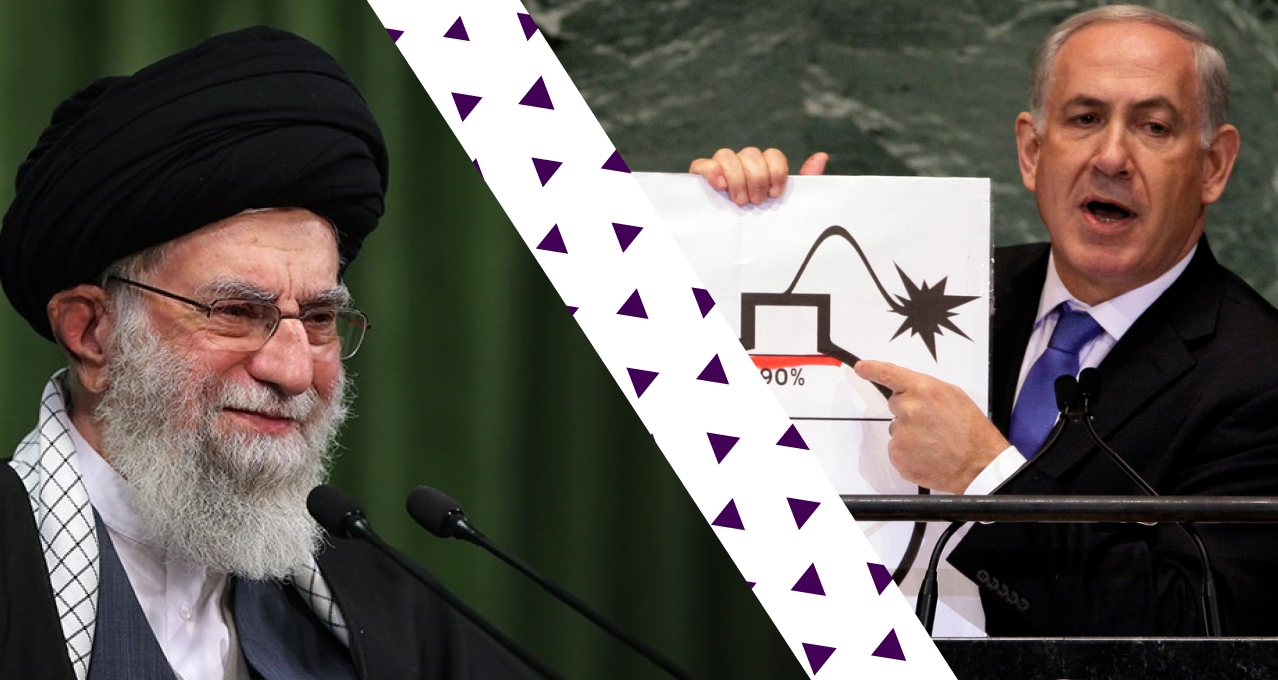


The issue of Iran’s nuclear program has long remained one of the most critical challenges to global security. The Trump administration made the last attempt to negotiate with Tehran. When Iran’s unwillingness to compromise became evident, Israel launched a massive attack on the night of June 13, targeting military and nuclear facilities within the Persian state. The consequences of this crisis could be felt globally.
The confrontation between Israel and Iran has de facto spanned since the 1979 Islamic Revolution in Iran. Its roots lie in a complex tangle of geopolitical, security, and religious contradictions. Tehran does not recognize Israel’s legitimacy and openly declares its desire for Israel’s complete destruction. For decades, both states have been locked in a cold confrontation: Tehran has developed a network of proxy forces in Lebanon, Yemen, and Syria (prior to the fall of the Assad regime), and provides support to Hamas in Gaza. Israel, in turn, has regularly carried out airstrikes on Iranian targets, cyberattacks, and assassinations of high-ranking military officials and scientists involved in military programs.
Iran’s nuclear program poses a particular threat to the Jewish state and regional security as a whole, especially given that Iran possesses ballistic missile technology with a range capable of striking Israel. By the end of 2024, according to IAEA information, Iranians possessed a sufficient volume of enriched uranium to develop several atomic charges. However, the complete picture remains unclear, as Iranian authorities deny IAEA experts access to some facilities. Moreover, Iran is expanding its nuclear capabilities, which, should a political decision be made, could enable it to create up to several dozen nuclear charges in the future.
The Donald Trump administration had been attempting to secure a nuclear deal with Tehran since spring 2025. This, incidentally, is one reason why Donald Trump sought Vladimir Putin’s favor, believing Putin could assist the U.S. in communication with Iran.
The first meeting between American and Iranian representatives took place on April 12. Despite initial American enthusiasm, negotiations reached an impasse, resulting in Tehran accelerating its uranium enrichment rates during the second half of May. Throughout June, tensions continued to escalate, with threats emerging against U.S. military bases in the region. Amidst the evident failure of the negotiation process, Israel commenced its operation.
The first reports of the attack emerged around 3 AM on June 13, swiftly followed by numerous accounts of casualties among high-ranking Iranian officials, particularly from the Islamic Revolutionary Guard Corps (IRGC), and confirmed hits on nuclear industry facilities. Some officials were neutralized by strikes on their residences. And although the “fog of war” still prevents a precise assessment of the attack’s full consequences, it is already evident that the leadership of the IRGC and the armed forces suffered casualties at the highest levels. Specifically, the Chief of the Army General Staff and the IRGC Commander were killed. Iran also confirmed the deaths of nuclear scientists.
Confirmed strikes hit the lion’s share of the Islamic Republic’s nuclear facilities, including those in Hamadan, Kermanshah, Khorramabad, and Natanz. In Natanz, Iranian government services have also recorded nuclear contamination.
Iran, for its part, launched hundreds of drones towards Israel, which appeared to be a relatively weak response to the initial large-scale strike. However, on the evening of June 14, ballistic missile strikes commenced. Iran also engaged its proxies in Yemen, the Houthis, who carried out missile attacks against Israel.
The exchange of strikes continues, and the prospect of a rapid de-escalation hinges primarily on the U.S. position. Washington, having been informed of the strike, is already attempting to leverage it as another argument to compel Iran to accept a nuclear deal.
On June 14, the parties continuously exchanged blows. Iran launched approximately 200 ballistic missiles, most of which, Israel stated, were intercepted. Israel added that 25% were not intercepted because they struck uninhabited areas.
On June 15, Iran’s Foreign Minister issued a statement indicating Iran’s readiness to cease strikes if Israel likewise refrains from attacking. He further added that Iran is prepared to sign an agreement renouncing its nuclear weapons development plans, and had intended to propose a draft during negotiations in Oman, which ultimately did not take place. Such a declaration might suggest Tehran’s willingness to make concessions. However, it must be noted that the final decision hinges on whether the terms outlined in the draft agreement prove acceptable to Washington and Tel Aviv.
Despite confirmed damage to key facilities, it is unlikely that Iran’s nuclear program has suffered irreversible losses. Some of the most critical complexes are situated underground, with others located within mountains, rendering their destruction impossible with conventional weaponry. Furthermore, considering its current enriched uranium stockpiles, Tehran may already be capable of developing at least one nuclear device. Israel’s apparent goal—to halt or even set back Iran’s nuclear program by years—might ironically trigger the opposite effect.
Until now, one reason why Iran, despite repeated threats, refrained from the actual creation of nuclear weapons, instead merely building capabilities and a scientific base, could be attributed to its desire to preserve the regional status quo. Tehran must understand that developing such a weapon would provoke a negative reaction from other regional players, both in the short and long term.
Saudi Arabia has explicitly stated that it would initiate the development of its own nuclear weapons in response to Iran acquiring such capabilities. Turkey has also articulated a similar, though less direct, position. Given that Israel already possesses this type of weapon, a successful completion of Tehran’s nuclear program would lead to a scenario where every militarily powerful state in the region would eventually acquire nuclear capabilities. This elevates risks for all parties involved, but most significantly for Iran itself, as its relations with Riyadh and Ankara are far from cordial.
However, the situation has now shifted. The Assad regime in Syria, an ally of Iran, has fallen, replaced by a new authority favorably disposed towards Turkey and, at minimum, not hostile to the West.
Israeli military and covert operations over the past two years, commencing on October 7, 2023, have dealt significant blows to Hamas and Hezbollah, as well as other forces that collaborated with Iran, even if not under its direct control. Iran’s capacity to wage asymmetric warfare against Israel and its regional influence infrastructure are diminishing, and political pressure from the U.S. is intensifying. Consequently, its room for maneuver is narrowing. In such a predicament, the government of the Islamic Republic may well accelerate its nuclear program to guarantee the stability of its political regime.
The negative effect of prolonged confrontation lies in the fact that the longer it endures, the greater the political losses for the side that yields. Israeli Prime Minister Benjamin Netanyahu has clearly stated that the operation will cease only if Tehran agrees to a nuclear deal, at minimum, although in other statements he has also indicated the goal of regime change in Iran. Concessions on this matter would be perceived as a defeat within Israel itself, an unacceptable outcome for Netanyahu. Despite numerous corruption allegations and a political crisis stemming from the 2023 judicial reform, he has thus far maintained power largely due to the onset of hostilities, which shifted public attention.
Nonetheless, Netanyahu’s political future remains uncertain. He needs to present a victory to the Israeli public to secure re-election, and ideally, to continue military actions against Israel’s adversaries to retain the support of other right-wing parties in the Knesset.
These rigid positions transform the conflict into a “zero-sum game,” making compromise exceedingly difficult, if not impossible. The United States, having publicly supported Tel Aviv’s strikes, is consequently unable to assume the role of a mediator.
Beijing and Moscow have expressed their support for Iran, publicly condemning Israel’s attack. Previously, while attempting to maintain good relations with Tehran, Moscow had opposed Iran’s nuclear program. However, following the intensification of military cooperation between these two “pariahs” of global politics, the situation may have shifted, even though Moscow stands to gain no direct benefit from the emergence of another nuclear state.
Russia’s most probable reaction will be an attempt to offer itself as a mediator in negotiations. Simultaneously, it will likely prolong the process as much as possible, seeking concessions from the U.S. administration in exchange for its assistance.
A negative consequence for Russia stemming from this new escalation in the Middle East might be a reduction in arms supplies from Iran. However, this is unlikely to significantly impact the Kremlin’s military capabilities, especially since Russians have long been producing some weaponry, such as Shahed-136 UAVs, domestically. Furthermore, other armaments, like artillery shells, would not be deployable in combat due to the lack of a land border between Israel and Iran.
An immediate positive effect for Moscow was the spike in oil prices, a typical market reaction to the deterioration of the security situation in the Middle East. However, as the conflict gradually becomes routinized, this effect is expected to wane.
Concerns exist that Iran, if strikes and external political pressure persist, might retaliate by blockading the Strait of Hormuz. This strait leads into the Persian Gulf and serves as a vital channel for transporting over a quarter of the world’s oil. On the other hand, such actions risk significant discontent from China. Amidst escalating economic problems in recent years and a trade war with Washington, Beijing does not need a shock to the energy market. Beijing is also the Islamic Republic’s main trading partner, including an importer of its energy resources, and, according to unconfirmed data, a partner in military technology. It is unlikely that Tehran would proceed with blocking the Strait of Hormuz unless the escalation of the conflict begins to threaten the very stability of the Ayatollahs’ regime.
Despite a certain satisfaction derived from strikes against a state openly supplying Russia with military technology and weaponry, this new flashpoint of conflict globally poses a threat to Ukraine regarding the stability of Western support. We witnessed this dynamic in October 2023 when Hamas attacked Israel, and we observed it again this week when the U.S., on the eve of the attack, diverted 20,000 anti-drone missiles initially designated for Ukraine to the Middle East. Should the conflict escalate, such undesirable instances could become more frequent, as the Donald Trump administration overtly demonstrates its favoritism towards Tel Aviv, in contrast to Kyiv.
Another threat we face is the sustained rise in oil prices, as this would enable the Kremlin to finance the continuation of the war, partially offset negative economic effects caused by the already ongoing recession, and halt the depletion of the liquid portion of its National Wealth Fund. However, we reiterate that such a scenario is currently improbable.
Overall, recent events bear the potential to escalate into yet another regional conflict, unless both sides refrain from further strikes. The influence of external actors, apart from the U.S. and China, on the situation is extremely limited. The scope for diplomacy is significantly narrowed due to the antagonistic positions of the Islamic Republic and the Jewish State, and the available means allow for continued attacks.
No posts found!
© 2025 ALL RIGHTS ARE RESERVED